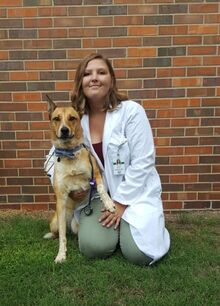Sarah Myers, DVM
|
Sarah Myers, DVM and graduate student at Oklahoma State University, is the BI Resident in Veterinary Parasitology. Dr. Myers is completing her PhD and clinical training toward board certification in parasitology under the direction of Dr. Susan Little and Dr. Ruth Scimeca, current Diplomates of the ACVM and key NCVP team members at OSU. A 2022 graduate of Kansas State University’s College of Veterinary Medicine, Sarah worked with veterinary parasitologists Dr. Brian Herrin, Dr. Kathryn Reif, and Dr. Jeba Jesudoss Chelladurai while at KSU. Sarah’s research interests center on ticks and tick-borne infections. In addition to her clinical training at Oklahoma State, her program will include parasitology experience at other veterinary colleges in North America and the opportunity to collaborate with others involved in veterinary parasitology throughout the animal health field.
. |
Five Questions with NCVP BI Resident Dr. Sarah Myers
Tell us a little about your background. Where are you from, what are some of the defining experiences of your life?
I grew up in Olathe, Kansas (a suburb in the Kansas City area) and spent a lot of my childhood hopping between the city and Lake of the Ozarks in Missouri, where I spent most of my time outside and around the water. I attended Kansas State University for my B.S and DVM degrees before moving down to Stillwater to start my residency here at Oklahoma State University.
How did you initially become interested in veterinary medicine?
Like many veterinarians, my interest in veterinary medicine started at a young age. As a child, I was always looking for ways to interact with and learn as much as possible about different animals. In high school, I participated in a specialized program focused on the animal health industry that exposed me to a variety of careers in the field and helped me pursue my goal of attending veterinary school through K-State's early admission program.
How did you become interested in parasitology? When did you know it would be your field?
In my last year of undergraduate, I needed one more biology credit to fulfill my requirements for veterinary school. My advisor recommended I take a course called Human Parasitology, because it would be applicable to my future courses. That class and the accompanying lab quickly became my favorite out of all of the courses I had taken, and sparked an interest that continued through vet school and transformed my career goals. Then, working with Dr. Herrin and his team over the summer, as well as all of the wonderful parasitology teams I met through externships during my clinical year solidified my interest in working in this field.
What focus have you chosen for your residency? Where will your research efforts be targeted?
While the final details of my research efforts have not been finalized, my focus will be on vector-borne diseases in North America. I am also looking forward to educating veterinary students and refining my diagnostic skills in the laboratory.
What is your plan after your residency? What would you like to accomplish over the course of your career?
While there are many opportunities to explore within this field that interest me, I have a particular passion for teaching and making an impact on the education of veterinary students and veterinarians. My overall goal is to build a career that can blend the areas of teaching, research, and diagnostics, but I'm keeping my mind open as I continue with my residency!
I grew up in Olathe, Kansas (a suburb in the Kansas City area) and spent a lot of my childhood hopping between the city and Lake of the Ozarks in Missouri, where I spent most of my time outside and around the water. I attended Kansas State University for my B.S and DVM degrees before moving down to Stillwater to start my residency here at Oklahoma State University.
How did you initially become interested in veterinary medicine?
Like many veterinarians, my interest in veterinary medicine started at a young age. As a child, I was always looking for ways to interact with and learn as much as possible about different animals. In high school, I participated in a specialized program focused on the animal health industry that exposed me to a variety of careers in the field and helped me pursue my goal of attending veterinary school through K-State's early admission program.
How did you become interested in parasitology? When did you know it would be your field?
In my last year of undergraduate, I needed one more biology credit to fulfill my requirements for veterinary school. My advisor recommended I take a course called Human Parasitology, because it would be applicable to my future courses. That class and the accompanying lab quickly became my favorite out of all of the courses I had taken, and sparked an interest that continued through vet school and transformed my career goals. Then, working with Dr. Herrin and his team over the summer, as well as all of the wonderful parasitology teams I met through externships during my clinical year solidified my interest in working in this field.
What focus have you chosen for your residency? Where will your research efforts be targeted?
While the final details of my research efforts have not been finalized, my focus will be on vector-borne diseases in North America. I am also looking forward to educating veterinary students and refining my diagnostic skills in the laboratory.
What is your plan after your residency? What would you like to accomplish over the course of your career?
While there are many opportunities to explore within this field that interest me, I have a particular passion for teaching and making an impact on the education of veterinary students and veterinarians. My overall goal is to build a career that can blend the areas of teaching, research, and diagnostics, but I'm keeping my mind open as I continue with my residency!

